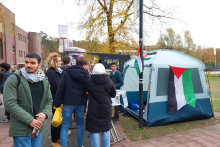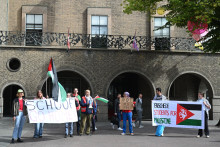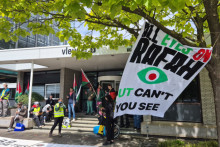What's going on in Amsterdam and Utrecht?
Hundreds of activists came to an encampment of pro-Palestinian demonstrators on Roeterseiland – a location of the University of Amsterdam – on Monday. Barricades were erected with pallets, fences and bricks. They demonstrated against Israel's violence and the attitude of the UvA and called for the severance of ties with Israeli institutions. Around 3 a.m., police broke through barricades and 125 protesters were arrested.
On Tuesday, activists placed tents and barricades on a site of Utrecht University. The police evacuated around midnight. Meanwhile, the University of Amsterdam was occupied for a second time last night. Elsewhere in Europe, protesters also set up tent camps at universities, as happened earlier in the United States.
Does the UT anticipate on such a protest on campus?
For the time being, the UT has not received any signals from groups that are planning to organize similar actions as in Amsterdam or Utrecht, spokesperson Laurens van der Velde says. The UT does not provide insight into possible safety measures. ‘But it should be clear that, in consultation with other stakeholders, we are closely monitoring the situation,’ says the spokesperson.
How much attention is there at the UT for the situation in Gaza?
Actions that have taken place in recent months can best be described as peaceful. In mid-November, for example, there was a solidarity action for Palestinian victims, during which students handed out snacks and flyers. A few days later, Amnesty Utwente organised a moment of silence at the O&O square for victims – on both the Palestinian and Israeli sides.
There is also an active group called 'Enschede students for Palestine'. Over the past few days, they have pasted posters on pillars on campus, including posters with the controversial text 'From the river to the sea, Palestine will be free'. Those posters were removed by Campus & Facility Management, Van der Velde says, 'because these kinds of texts go against our house rules and core values'.
Is there room to protest at the UT?
'At our university, there is room to protest peacefully and to have an open debate, provided that it is done in a respectful manner without violence or vandalism,' says Van der Velde. He adds that the UT's house rules 'form the framework within which such activities may take place'.
What about the ties between the UT and Israeli institutions?
'The UT does not have an exhaustive overview of all collaborations with Israeli universities,' says Van der Velde. 'In any case, the impression is that this is only the case to a very limited extent and that it mainly concentrates on individual peer-to-peer collaboration between our scientists and those of other universities.'
Formally, the Israeli university Technion in Haifa is a partner institution of the UT and there is the possibility of student exchange. This came about when the UT joined the Global Education Engineering Exchange in 2016. It is currently unclear how active this exchange cooperation is. There are, however, joint activities in the field of research. UT scientists recently wrote joint articles with colleagues from the Israeli institution – at least one in 2024 and five in 2023.





